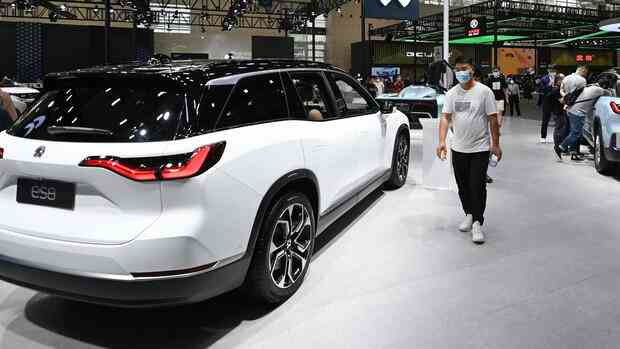Human rights violations, geopolitical difficulties and supply chain problems – the risks in doing business with China are increasing and companies are being forced to reconsider their involvement in China. The public debate always revolves around the Dax heavyweights BASF, Siemens or Mercedes. The automotive supply industry is also in a particularly tricky situation.
The German automotive suppliers have to invest billions to develop components for the transformation to electromobility. It is the fate of the industry. The competition is incomparably big. Where five suppliers used to bid on an order for drive parts, there are 25 in the electric age. So far, no one has made any money from it, not even world market leader Bosch.
That is set to change for the Swabian automotive supplier this year. Not in Germany, but in China, announced Bosch boss Stefan Hartung, that the profit zone will be reached for the first time with electric axles and motors. Customers are also primarily the up-and-coming Chinese manufacturers of electric cars. China is the reference market for electric mobility – not Germany, not the USA. Hartung says that anyone who can make it in China can make it anywhere.
Bosch and ZF make 20 percent of their sales in China
ZF, the second largest German supplier, also follows this logic. ZF installs its 800-volt power electronics for fast charging in top models from Chinese car manufacturers. Nio, for example, is also the first Chinese customer for the new fully electric steering system.
The newcomers put a lot of pressure on, but pay high prices for German components. The Chinese have long been lagging behind the German car manufacturers in their home market, not only with electronic gimmicks, but also in terms of driving performance.
>> Read also: Siemens stops relocations to China – this country is instead the focus for new investments
So much for the importance of the Chinese market. To withdraw from this market would be self-decimation. China accounts for 20 percent of total group sales at Bosch and ZF. 55,000 Bosch employees work in China, which is one in eight employees.
That means: The leading duo of the German automotive supplier industry cannot do without China – not in the short term, not in the medium term. On the other hand, not preparing for the scenario of an escalating conflict between the USA and China, for example over the Taiwan question, would be negligent. The suppliers are now pursuing a strategy that takes both aspects into account.
Trump draws a red line on the Taiwan issue
With the current supply chain problems, both Bosch and ZF aim to serve the Chinese market locally if possible. That explains the billions invested in the country. 80 percent of products made in China stay in China. ZF also follows the credo “local for local”.
China is a top priority at the Bosch foundation company.
(Photo: dpa)
This shows the importance of the market, but is also part of the strategy to minimize the risks for the worst case. Because if China invades Taiwan, the decoupling of the China business should be unavoidable. Even the head of laser specialist Trumpf, Nicola Leibinger-Kammüller, has declared the occupation of Taiwan as a red line for her commitment to China. A few years ago, Trumpf was the only mechanical engineering company that was allowed to take over a Chinese competitor.
>> Read also: “We’re running out of time”: That’s how big the China risk is for the solar industry
Before Holger Klein became ZF boss at the beginning of the year, he managed his chassis technology business unit from Shanghai for four years. The Bosch boss is also responsible for the group’s China business. China is a top priority in foundation and family businesses and should actually be in every larger company. Because everyone actually knows that China cannot be the eternal cash cow.
Bosch boss Hartung sees it very pragmatically. His dual strategy: it doesn’t work without global cooperation, and it doesn’t work in the long run either if the economic dependencies are too great. Bosch is not only the world’s largest automotive supplier, but also builds refrigerators, drills and heat pumps, among other things.
Investments India, Vietnam, Egypt and Mexico are picking up
For more than 137 years, the foundation group has seen its salvation in diversification in products and regions. Bosch has been in China for over 100 years. After all, ZF has been for over 40 years. Thanks to its strong business in China, Knorr- Bremse is the world market leader in brakes. Such a market position is not easily given up.
On the other hand, it is noticeable that investments in countries such as India, Vietnam, but also Egypt and Mexico are increasing significantly. Every third of the 44,000 software specialists from Bosch who are indispensable for the present and the future work in India. And Bosch is investing three billion euros in the semiconductor technology located in Germany, three times as much as in China. By 2027, competitor ZF and partner Wolfspeed will have built a chip factory in Saarbrücken from scratch.
Reducing dependencies without jeopardizing business in China in the short term – that is the right strategy. It remains to be seen whether the global political situation will give companies enough time for a better regional balance on the China question. Given the current conflicting goals between politics, business, society and morality, the both/and tactic is certainly not one that Hartung or Klein will get applause for, but it is more honest than it looks.
More: For Bosch, China is becoming the key market for electric cars
